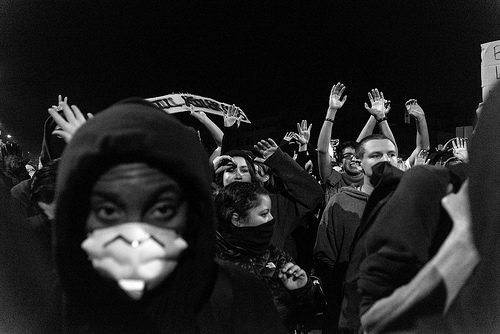Violence, #BlackLivesMatter, Justice and Blame
Is the Black Lives Matter movement violent? How does this compare to the Civil Rights Movement of the 1960s?

Recent killings of unarmed black men and women in the United States have given rise to the Black Lives Matter movement. The group has staged open protests in cities like Ferguson and Baltimore; and, demonstrators have disrupted campaign rallies for candidates such as Bernie Sanders. Beyond the protests, a recent spate of police shootings has been blamed on the Black Lives Matters movement. Many pundits have pointed to the Civil Rights Movement as an example of a movement that accomplished a great deal without resorting to violence. But is that really the case? In an article early last month, Washington Post journalist Simone Sebastian argues that the Civil Rights Movement actually did court violence. She joins Stephen to discuss her article. Lester Spence, Professor of Political Science and Africana Studies at Johns Hopkins University, also joins the conversation.
- Criticizing Black Lives Matter: Professor Spence says, “There are legitimate criticisms to be made about [the Black Lives Matter] tactics.” But he says the loudest detractions have a political bent, such as the police and conservatives. He says the politics should be kept in mind when giving legitimacy to those criticisms.
- Historical Perspective: Simone Sebastian says, “We’ve forgotten that at the time Rosa Parks and Martin Luther King [Jr.] were extremely radical.” She says that there was actually a great deal of violence around the Civil Rights Movement. She says the movement was very aware of how important violence was to getting attention to their grievances. She says leaders weren’t passive but actively put themselves in situations that would put them in violence’s way. Sebastian says people wouldn’t be talking about Black Lives Matter had it not been for police brutality or violence.
Click on the audio player above to hear the entire conversation.

